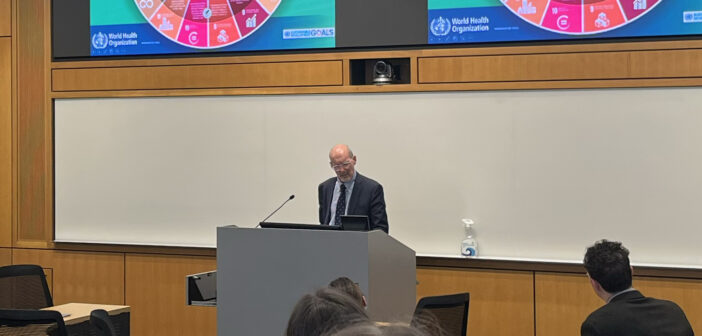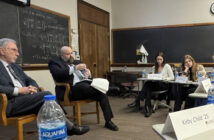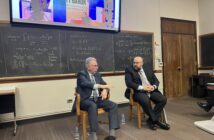Werner Obermeyer jokingly started his presentation by telling a classroom full of students he hoped his presentation on health issues around the globe wouldn’t give anyone indigestion.
But physical health was only one of the many topics Obermeyer discussed when he visited Lehigh last week to speak with students and representatives from the College of Health. His presentation, titled “The Role of WHO and the Future of Global Public Health,” covered the World Health Organization’s role in the United Nations’ Sustainable Development Goals, universal health coverage, and health emergencies among other health-related concerns around the world.
Obermeyer is the director of the World Health Organization in New York City, which is a specialized extension of the U.N. focusing on international health initiatives.
He was joined by his associate, Technical Officer Eva Kiegele, on Friday, Oct. 27. They took a campus tour; met with the dean of the College of Health, Elizabeth Dolan; and spoke with Lehigh students and faculty.
Krista Liguori, a community and population health professor, helped facilitate these events with Lehigh’s Office of U.N. Programs.
She said he wanted “face time” with students to hear what they are thinking and concerned about. A lunch that preceded the larger presentation was what Liguori called “a less stressful environment” for asking questions and learning about topics students are personally researching.
She wanted students who study health to see how the concepts in class apply to the real world — that the concepts are important and changes are happening from WHO specifically.
“It shows them how important some of their classes are to what they might be doing in their career,” Liguori said.
Obermeyer has been to Lehigh, both in person and virtually, a handful of times throughout his nearly 17-year-long position at WHO.
He said there was a perception when he first joined the organization that health topics should be discussed solely in Geneva, where WHO’s headquarters is. However, he said this has changed, especially since health overlaps with many other fields of study.
“It’s not as if you work only on nutrition or only microbial resistance,” Obermeyer said. “You have to be knowledgeable on everything.”
Before joining WHO, Obermeyer served in the South African Foreign Service as a senior diplomat and also has been the representative of the U.N. Environment Program in New York.
When he began at WHO, Obermeyer was the only person with a diplomatic background, giving him the knowledge and experience the organization’s leaders were looking for.
With a diverse set of skills under his belt as a diplomat and representative, covering areas such as trade and multilateral relations in addition to work between the fields of health and the environment, Obermeyer said WHO needed his voice — someone who could specifically talk to diplomats about health.
Obermeyer was responsible for all the health targets within the U.N. Sustainable Development Goals — 14 of the 17 goals have health targets in them.
“That’s why we say that health is a precondition or indicator of sustainable development,” Obermeyer said.
He also helps oversee initiatives related to the Sustainable Development Goals, such as the Triple Billion targets.
Obermeyer said the Triple Billion targets outline a plan to provide one billion people with universal health coverage, an additional one billion people with better health and well-being, and another one billion people with health emergency protection.
Though the organization doesn’t work with individual countries’ health ministries, WHO works with nearly 200 member states through a more global perspective. Countries and health ministries collect data and information and work with WHO to understand global needs.
Obermeyer said he was grateful every topic raised by students during his conversations was also a priority at the New York office — it assures him the work they are doing is worthwhile.
Rhema Hooper, ‘26, is a student in the College of Health. She attended the lunch conversation and main presentation with Obermeyer and said she would have liked to discuss more country-, region- or organization-specific issues.
However, she did like how he responded to students’ questions, bridging topics together from what seemed to be different categories.
“I really appreciated his humility,” Hooper said. “(He was) willing to discuss any topic, whether it was general or more specific.”
Liguori said most health-related members of the Lehigh community have felt less connected to U.N. programming because it often feels too political, so having a healthcare distinction makes it more appealing to new groups.
“You have to market it as being something that’s worth their time,” Liguori said.
Because the College of Health is new and expanding, Liguori said experiences like these with global leaders allow the college to embed international experiences into the curriculum as it develops.
Obermeyer said it is motivational to spend a day with people who talk passionately about study areas that intrigue them, and he looks forward to future collaboration between WHO and Lehigh.
“It’s really nice to be able to engage those people that are open-minded (and) are interested to learn,” Obermeyer said. “You don’t always find that when you’re in the (U.N.) building with the diplomats.”






Comment policy
Comments posted to The Brown and White website are reviewed by a moderator before being approved. Incendiary speech or harassing language, including comments targeted at individuals, may be deemed unacceptable and not published. Spam and other soliciting will also be declined.
The Brown and White also reserves the right to not publish entirely anonymous comments.